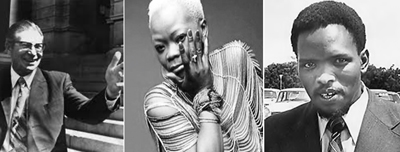Latest News Archive
Please select Category, Year, and then Month to display items
01 July 2021
|
Story Dikgapane Makhetha
|
Photo Supplied

This year, the young people of South Africa celebrated 45 years of the annual commemoration of
Youth Day. The University of the Free State (UFS)
Community Engagement (CE) office on the
Qwaqwa Campus has engaged a number of stakeholders in the call to use football as a means of bringing people together, transforming lives, and enthusing communities. Through partnerships, community organisations have great potential to create opportunities for breaking down barriers and inspiring social cohesion, initiating enablement through the development of social projects, and promoting education and health awareness.
On 16 June this year, local community organisations collaborated in the hosting of a soccer event for the youth of Qwaqwa at the FIFA Football for Hope Stadium in Tsheseng.
The Agape Foundation for Community Development,
Love Life,
Right to Care,
Youth in Action, Qwaqwa FIFA Project, and the Tsheseng Athletics Club were all stakeholders who diligently joined forces to ensure the successful launch of the tournament. Community development practitioners, who are trainees in the UFS Qwaqwa Department of Community Development, were garbed in departmental branded gear and have cautiously facilitated adherence to COVID-19 protocols. About 250 people, including football fans and participants, attended and enjoyed the entertaining games. Through the partnered recreational project, the Qwaqwa Campus CE office responded to the 2021 Youth Day theme: ‘Growing Youth Employment for an inclusive and transformed society’, by enhancing opportunities for networking among stakeholders. Football is popularly known for promoting transformational social projects in diverse communities across the globe.
Understanding the nature of prominence
2014-03-14
|
 |
What did Hendrik Verwoerd and Steve Biko have in common? Or perhaps Johannes Kerkorrel and Brenda Fassie?
“They all possessed a certain natural predisposition to prominence,” says Prof Paul Fouche, reseacher in psychobiography at the University of the Free State’s Department of Psychology.
Prof Fouche and a team of researchers from other South African universities released findings on psychobiographical studies done on personalities that played a great role in our history.
The studies show that notable historical figures were very often prolific readers with a passion for literature since childhood. Generally, they also had a great love for nature and a sense of the sacredness of it, as well as a love for the cosmos.
The study further reveals that many of them were forced to take up leadership roles in the family from a very young age and were driven to succeed in order to take care of their own.
In many of these cases, there was a strong partner who supported the leader while they went about the business of governing their world.
Psychobiography is the systematic and descriptively-rich case study of renowned, enigmatic or even contentious individuals in socio-historical contexts within a psychological frame of reference. Over the past decade, psychobiography has become an established research genre and a methodology used by various academics and scholars in the field of life history research.